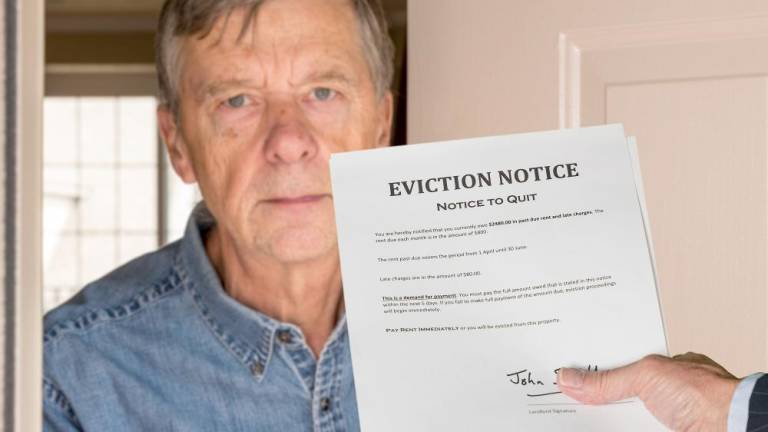(AP) A federal freeze on most evictions enacted last year is scheduled to expire July 31, after the Biden administration extended the date by a month.
The moratorium, put in place by the Centers for Disease Control and Prevention in September, was the only tool keeping millions of tenants in their homes. Many of them lost jobs during the coronavirus pandemic and had fallen months behind on their rent.
Landlords successfully challenged the order in court, arguing they also had bills to pay. They pointed out that tenants could access more than $45 billion in federal money set aside to help pay rents and related expenses.
Advocates for tenants say the distribution of the money has been slow and that more time is needed to distribute it and repay landlords. Without an extension, they feared a spike in evictions and lawsuits seeking to boot out tenants who are behind on their rents.
As of June 7, roughly 3.2 million people in the U.S. said they face eviction in the next two months, according to the U.S. Census Bureau’s Household Pulse Survey. The survey measures the social and economic effects of the coronavirus pandemic every two weeks through online responses from a representative sample of U.S. households.
Here’s the situation in New Jersey:
WHAT’S THE STATUS OF EVICTION MORATORIUMS IN THE STATE?
New Jersey is one of several states that enacted a moratorium last year halting eviction proceedings. New Jersey’s moratorium will remain in place until Jan. 1, 2022, at the latest because of a bill Democratic Gov. Phil Murphy signed into law. The moratorium doesn’t affect when rent is due, and tenants still owe the rent.
WHAT’S BEING DONE TO HELP PEOPLE FACING EVICTION?
The state is providing $353 million in rental assistance to low- and moderate-income households experiencing a substantial reduction in income. The state has also gotten notice from the federal government that another $272 million under the American Rescue Plan will apply to rental assistance. The application period will remain open until all funding has been awarded, according to the Department of Community Affairs, and landlords can apply on behalf of tenants, with the tenant’s permission.
The state is also launching the Expanded Access to Counsel and Homelessness Diversion Anti-Eviction Pilot this summer to offer legal and safety-net services to low-income households facing eviction.
The state has also been notified by the federal government that it will be awarded nearly 1,000 vouchers for emergency housing assistance to help homeless people. That’s in addition to 12 months of federal rental assistance to about 1,500 households facing homelessness.
Beyond that, the Democrat-led Legislature passed a budget appropriating $500 million in federal funds to help renters pay rent. The bill is being considered as part of the annual budget, which must be enacted by July 1.
HOW ARE THE COURTS HANDLING EVICTION HEARINGS?
Landlord-tenant trials are on hold until further notice in New Jersey. Other actions, like motions and settlement conferences, can continue. Under the state Supreme Court’s July 14 order last year, evictions can only occur in emergencies and cannot be based on failing to pay rent. Trials can only be held in the event of the death of a tenant or if the court determines that an emergency exists, such as documented violence, criminal activity, or other health and safety concerns, according to the state courts.
HOW AFFORDABLE IS HOUSING IN THE STATE’S MAJOR RENTAL MARKETS?
As of May, the median monthly rent in the New York-Newark-Jersey City area stayed flat over the last year at $2,400, according to a report released June 16 by Realtor.com. The metro New York region is considered among the priciest in the country.
In the Philadelphia-Camden area, rents climbed 3.2% to $1,600 overall.
Median rents for a two-bedroom apartment in the northern New Jersey area rose 6.9% to $2,725 as of May, according to the report, and 4.7% to $1,800 in southern New Jersey.
ARE EVICTIONS EXPECTED TO CREATE A SURGE IN HOMELESSNESS?
It’s hard to say how much homelessness will increase in New Jersey. The U.S. census estimates that out of about 270,000 renters, about 91,000 are considered ``very likely’’ to leave their homes because of evictions. New Jersey conducted a ``point-in-time’’ count of homeless people in January, but the data is not yet available, according to the state Community Affairs Department.


